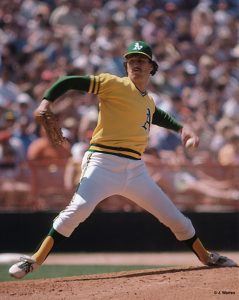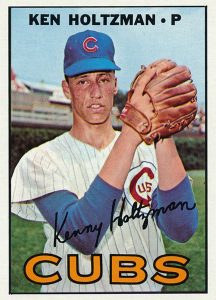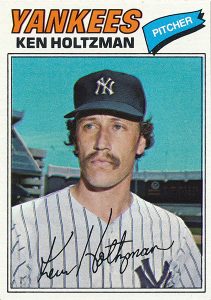Q/A with Ken Holtzman: On 3 World Series rings with A’s; beating Sandy Koufax; memorable encounter with anti-Semitism
 The Mt. Rushmore of great Jewish baseball players definitely includes Ken Holtzman.
The Mt. Rushmore of great Jewish baseball players definitely includes Ken Holtzman.
After all, it is Holtzman, not Sandy Koufax, who is the Jewish pitcher with the most career victories: 174. He didn’t throw four no-hitters like Koufax, but his two no-nos still rank as an impressive feat.
This week marks the 37th anniversary of his first no-hitter. On Aug. 19, 1969, the Cubs pitcher shut down down Hank Aaron and the hard-hitting Atlanta Braves at Wrigley Field. Watch the video of the last out.
In honor of that no-hitter, it seems appropriate to run Holtzman’s Q/A this week. The JBM’s Dan Epstein conducted this interview while researching “Big Hair and Plastic Grass,” his entertaining book about baseball in the 1970s.
As you will see, Holtzman always remains one of the most interesting and thoughtful individuals ever to put on a Major League uniform.
****
Short Takes
“I take pride in being the last National League pitcher to beat Sandy and it remains a very special moment of my career.”
“I encountered my share of anti-Semitic insults during my career from fans, players and other persons associated with the game. New York was no different, but I chose not to let it affect me as I was dedicated to my craft and felt that any distraction from the job at hand was not fair to me, my teammates and the people that hired me.”
“Although the Israeli Baseball League turned out to be poorly planned and financed, the experience of seeing Israel for several months made it worthwhile. Getting to see the whole country and meeting many Israelis was very educational, and gives one a different perspective than just reading about the situation and making uninformed judgments as many do here in this country.”
****
JBM Interview
Of all your baseball accomplishments, which remains the most satisfying to you: Winning three World Series rings as a member of the Oakland A’s, pitching two no-hitters for the Cubs, or being the winningest Jewish pitcher of all time?
Of the three choices given, I would say winning the 3 rings is tops. However, I’ve said many times my biggest thrill and accomplishment remains the first time I walked onto Wrigley Field in a Cubs uniform, because it validated all the hard work and sacrifices that I made to reach the big leagues. The other milestones were very satisfying but, in a sense, anti-climactic. Achieving a childhood dream is hard to surpass.
You were still a teen when Sandy Koufax came into his prime. It has been said that Koufax was a hero of yours; did his Jewishness play a part in why you looked up to him, or was it more that (like you) he was a lefty with a nasty fastball and curve?
Growing up a Cardinal fan here is part of the local culture where I live. However, because of the obvious ethnic identification, our family took great pride in Sandy’s accomplishments and created a “confused” rooting pattern when he pitched against the Cardinals. For a kid growing up in St. Louis, the ultimate nirvana experience is to become a Cardinal and win a Word Series. I was fortunate to be on many World Series Championship teams, even pitching and winning a seventh game of a World Series, but, unlike David Freese, (who lives about a mile from me) I never had the opportunity to play for my hometown team.
 You and Koufax started exactly one regular season game against each other — September 25, 1966 — which also turned out to be the third-to-last start of his career. You threw a complete game for the Cubs, and beat him 2-1. What do you remember about that game?
You and Koufax started exactly one regular season game against each other — September 25, 1966 — which also turned out to be the third-to-last start of his career. You threw a complete game for the Cubs, and beat him 2-1. What do you remember about that game?
The game I pitched against Sandy occurred the day after Yom Kippur and was originally scheduled the day of the holiday, but was pushed back because we both attended services and did not show up at the park. My parents were in Chicago for the holidays and they were at the game seated directly behind home plate, so I could see them every pitch. However, my mother actually saw none of the game, because she said she was so nervous she walked around the park the entire game without sitting down. I take pride in being the last National League pitcher to beat Sandy and it remains a very special moment of my career.
On September 6, 1972, you and your A’s teammates Mike Epstein and Reggie Jackson wore black armbands on your uniform sleeves to honor the Israeli athletes who’d been kidnapped and murdered during the Olympic Games in Munich. It was pretty uncommon in those days for baseball players to make any kind of on-field commentary about world events. What do you remember about making that statement?
The game was in Chicago and when Mike and I heard the news from Munich we were both devastated. I can’t remember which of us suggested the armbands, but I remember we were walking the streets outside the hotel for several hours wondering what would be an appropriate sign of respect and we decided on the armbands. We told the clubhouse attendant when we arrived at the park to see what could be done on such short notice, and he arranged for the armbands to be sewn on by a local tailor. We later found out that Reggie had learned of our plans and requested that his uniform should also be fitted with the bands. Our manager, Dick Williams, was very respectful — as were the other players — and I think they stayed on our uniforms for a long time.
Mike Epstein’s nickname was “Super Jew” — did you find that funny, or did that make you cringe?
Mike was, and is, a very close friend and we shared a lot of our most intimate feelings with each other. The fact that he was dubbed “Super Jew” was a label of respect and described not only his baseball ability but his size and strength. Personally, I was glad I had a “Super Jew” standing about 90 feet from me on the field in case there was a fight! (And, as is widely known, we had many)
 Reggie Jackson has claimed that Billy Martin’s anti-Semitism was to blame for your troubled tenure with the Yankees. Do you think that’s an accurate assessment? Did you encounter a significant amount of anti-Semitism during your playing career? If so, was it from teammates and opposing players, or more from the “old school” managers and owners you encountered?
Reggie Jackson has claimed that Billy Martin’s anti-Semitism was to blame for your troubled tenure with the Yankees. Do you think that’s an accurate assessment? Did you encounter a significant amount of anti-Semitism during your playing career? If so, was it from teammates and opposing players, or more from the “old school” managers and owners you encountered?
I encountered my share of anti-Semitic insults during my career from fans, players and other persons associated with the game. New York was no different, but I chose not to let it affect me as I was dedicated to my craft and felt that any distraction from the job at hand was not fair to me, my teammates and the people that hired me. Sometimes, on a deeply personal level, I had to confront it directly like I did when I was growing up; and since I never ran from anything in my life, I wasn’t about to run away from some bigot without a face to face challenge.
Once, in the amateur leagues in St. Louis, I was on a team without any other Jewish players, and during one game in a very rural part of the state, an opposing player kept yelling anti-Semitic insults and threats at me throughout the whole game from their bench. Finally, this same player came to bat and I was glaring at him the whole time he stepped to the plate. Our catcher (a very close Catholic friend of mine who I literally grew up with) called time and came to the mound and started laughing because he knew what I was going to do. He said, “Look, if you’re going going to get him, wait till the 3rd or 4th pitch so I can warn everybody else to be ready for some action.” On the first pitch, I tried to throw a slow curve away so that he would begin to lean over the plate and provide an even bigger target on the subsequent pitch. I did the same thing on the second pitch but he stuck out his bat and hit a weak grounder back to me and then, all of a sudden, instead of running right to first base, he threw his bat at me and then started to run.
With the ball in my hand I’ll confess I had thoughts of being the first pitcher to throw a knock down pitch to a base runner on his way to first. Unfortunately, my catcher tackled the guy and prevented me from getting to him. My father was at the game, and he came out of the stands and tried to get at the guy as well. All hell broke loose with the fans, and the cops had to restore order.
Believe it or not, about 40 years later, this same player came to the JCC where I was working, introduced himself and promptly apologized for his behavior 40 years earlier. I immediately accepted, told him I never forgot the incident, and that he was lucky I didn’t get to flatten him and break three of his ribs. We both laughed, went out and had a beer together, and still stay in touch.
By the way, during my 15 year career, the high holidays frequently occurred during the season and every manager was respectful of my wish to go to services and not attend the game those days.
Some writers dubbed you “The Thinker,” since you seemed much more intellectually inclined than your baseball peers — and I’m pretty sure you’re the only major leaguer in history who’s ever been quoted as saying you preferred to read Proust in the original French. Where did your intellectual curiosity come from? Do you think your intelligence gave you an advantage as a pitcher?
Baseball, to a large extent, is an instinctive sport in which “book smarts,” as the players like to refer to them, are only good for winning chess and bridge tournaments in the clubhouse. The only intelligence which is relevant is that which is needed to make day to day adjustments in order to compete with the best players in the world and not get overwhelmed. In order to reach the big leagues and STAY in the big leagues, one must have an innate knowledge of the game including its strategy and techniques. There are no dummies in the big leagues and, to me, one’s college grade point average should equal one’s ERA. (I think my career ERA is about 3.4 which is just about my career college G.P.A.)
You were no Hank Greenberg, but you did hit a cumulative .308 in the post-season, with three doubles and a homer. Was it frustrating for you when the Designated Hitter rule was established, effectively taking the bat out of your hands during the regular season? In retrospect, what do you think of the DH?
I personally like the DH because it enabled me to stay in the game longer and not be pinch hit for. I never wanted to be taken out of a game, regardless of the score or situation, and the DH enabled me to pitch more innings, even though I would have to face one more tough hitter in a line-up than existed in the National League. I also think, theoretically, it should speed up the game. The way the game has evolved, however, even American League games suffer from all too frequent pitching changes, and specialization consequently resulting in longer game times.
In 2007, you went to Israel to manage the Petkah Tikva Pioneers in the short-lived Israel Baseball League. What was that experience like?
Although the Israeli Baseball League turned out to be poorly planned and financed, the experience of seeing Israel for several months made it worthwhile. Getting to see the whole country and meeting many Israelis was very educational, and gives one a different perspective than just reading about the situation and making uninformed judgments as many do here in this country. I’m glad I went,and I hope one day Israel is able to plant the seeds of amateur, high level baseball leading to competitive international competition.

